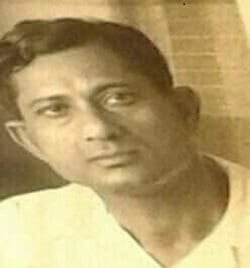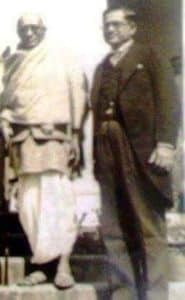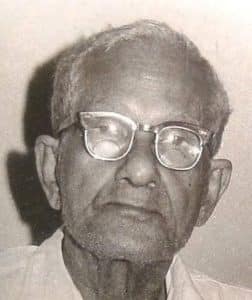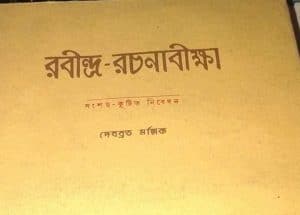
I have always been proud to be my Baba’s daughter. I do not have his outstanding intellect or his ability to burn the midnight oil, but I did inherit his love for learning.
Baba, Debabrata Mallick, came from an indigent family, his father having passed away when he was very young. The story goes that Baba often would study by the light emitted from the kerosene stove he used for cooking. He always stood first in all the exams and in all the subjects. After finishing school, he went to St. Paul’s College in North Calcutta where the Christian fathers were very kind to him. They made arrangements so that Baba could attend Philosophy Honours classes in Presidency College which was beyond his means to join. He stood first in the University in Philosophy Major and topped all the subsidiary subjects too, surpassing himself in Sanskrit. The Christian fathers were willing to raise money for him to travel to England and take the Indian Civil Service examination. Baba’a pride prevented him from accepting money, so he sat the Bengal Civil Service exam instead. Again he stood first with record marks. With the compulsions of running the household and taking care of his mother and three sisters, taking up a job at the earliest was his priority. Given his brilliance, hard work and integrity, he did very well in his career having landed some stellar assignments usually meant for the ICS officers. He made sure all his sisters completed their studies.
Baba was a recluse, moody, and at times unsociable but when he was inclined to be communicative, he could be an amazing story-teller. At the dining table he would regale us with his stories. Born in 1900 he had seen the two World Wars, Japanese bombing, the struggle for Independence, the first tram, electricity and many more things. What I used to enjoy most were stories about eminent Indians like Sarojini Naidu, Sir Asutosh Mukherjee, Gandhi and Nehru. He always regretted the fact that he could not join the freedom struggle in his youth as he had to earn for the family. His eyes would fill with tears when he told us about a young freedom fighter who blew up a bridge. The young man was hanged and as a magistrate Baba had to watch him hang. This affected him so intensely, his emotions so intense that his eyes suffered a hemorrhage.
At the age of 36 in 1936, he married Ma. It was an arranged marriage; they were a total mismatch. I do not have any memory of my parents doing things together. Both were very dutiful in their own way and could not be faulted. Most of the time Baba was away in the districts of Bengal while Ma remained in Calcutta with us. He would make brief visits home during weekends. We also would stay with him during our vacations. Baba was posted as the Magistrate of Nadia after the Indian independence and partition of Bengal. It was a very important assignment. I still remember the palatial house and that whenever he went out, he was surrounded by armed guards. We, my brother and I as children, enjoyed this and would run to the guards to get them to salute us too. When my mother discovered our prank, we were slapped hard for such behaviour and made to apologize to the guards.
Baba’s honesty was well-known. Offering bribes to him was simply unthinkable. One day somebody came with a basket of fruits; Baba threw it away with a kick. The memory of that incident remains with me still.


The famous story of Baba’s courage was the letter he wrote to C. Rajagopalachari, the Governor General of India who wished to visit Krishnanagar, the headquarters of Nadia. Baba wrote to him saying that he was most welcome to come but only with his daughter and not his entire entourage. The Governor General was a great person and he did exactly that – came with his daughter and only two bodyguards. There is a black and white picture of this visit, one of my most precious possessions..
In those days government servants were not at all well-paid and since my parents had two establishments things were rather difficult. In Calcutta we did not have a car and we used public transport – bus, tram or a hand-drawn rickshaw. Very rarely, did Ma take a taxi and that too for short distances. We were taught certain household chores and to polish our own shoes, make our own beds. But both of us are grateful to our parents for teaching us the dignity of labour, that no job is demeaning. We were tenants of the famous actress Suchitra Sen’s father-in –law. The house though located in an urban area had all the beautiful ambience of a rural place. There was a huge pond at the back of the house belonging to the landlord and many coconut trees around that pond. One of the trees leaned against our terrace. I had great fun touching those leaves and making flutes out of them. I could spend hours watching kingfishers catching fish by the pond.
It was sad that Baba had little time for us. His work took up all his time. I have vague memories of his visits. His next posting was Medinipur. Again, a huge palatial house. My parents never spent any money in decorating the house, so the rooms were sparse. We had the very minimum as far clothes were concerned. But both of them made sure we went to the best schools in Calcutta. I was enrolled in St. John’s Diocesan school and went to Presidency College (my parents never paid for that as I was on a scholarship). Bhaiya went to St. Xavier’s and later on to Bengal Engineering College to do Metallurgy.
The last position held by my father was that of Regional Provident Fund Officer. And he was in Calcutta . The retirement age was 55 in those days and he got an extension for a year. He put all his provident fund money in building the house in New Alipore. It was a smallish plot but in a very good position. He was clear in his mind about what he wanted. He knew that part of the house had to be rented out to subsidize his pension. A huge number of building plans for the house was made by architects. Baba being a perfectionist did not like any of them. He took leave for 6 months (the only time he took leave) and studied architecture and made the house in such a way that there was maximum utilization of place within the permitted rules. Needless to say, he had to do the whole thing on a tight budget. I have vivid memories of his inspecting the work of the masons and other workers. Even after 62 years, the house still stands rock solid and requires little maintenance. The thing that amazed me was that he would keep saying that the downstairs would be mine. In fact, the house is built in such a way that it is like two separate apartments. How did he think of giving his daughter an equal share? All I know that I am grateful to him for doing that. I have a roof over my head because of his sagacity and his broad-mindedness.
He spent his extended retired life just the way he wanted. He studied and studied and wrote and wrote. He had one of the finest brains and the ability to work 18 hours a day at times. I always tell my daughter Ananya that she has inherited her Dadu’s qualities. What a proud man he would have been to see his grand-daughter, the youngest Dean at the University of Berkeley. He was working on a theory that Rabindra Nath Tagore’s knowledge of Sanskrit was not perfect. This was not to denigrate Tagore but to engage in a Goethe like discussion. This meant he had to read the entire works of Tagore that ran into more than 20 volumes and go through the Vedas and the Upanishads as well. He was reading and making notes. I still have a trunk full of those rough notes. I had to take him to the National Library or the Asiatic Society. Ashish, my husband, gave him rolls of white plain paper for his writing and the car to go the libraries.
Baba was never reticent when it came to helping people. He was held in the highest esteem by other residents of New Alipore who came to Baba for various problems. After building his own house his acquired knowledge was better than any engineer’s. That was one subject. The second was problems related finance and taxation. With his phenomenal memory he seemed to know every section of income tax law and corporation tax. No wonder I have this interest in finance . If anyone did not understand any Sloka in Sanskrit they came to him. I just mention a few because the list is endless.
He was whimsical as well. After retirement he decided to take up gardening. The roof was full of pots and plants and people would come from various nurseries to give us seeds or seedlings. I was his helper. As usual, Ma only complained but when those trees had flowers Ma would ask our cleaner Baiju to bring them down to the first floor veranda to flaunt them. The whole of New Alipore was amazed that a scholar like Baba would have green fingers too. One night, I was woken up at 2 am. We had to run to the terrace to rescue some seedlings from torrential rain. The roses he grew definitely would have got prizes had he decided to join any competition. There was one particular rose which when it first bloomed was white, then it became yellow, then pinkish red and died dark red.
Then one fine day he lost his interest in gardening and he was back to his research and studying sometimes 16 to 18 hours a day. I have never seen anybody spending his retirement period so fruitfully. Maybe this was his dream to devote himself to studies and that’s what he did. He worked at writing a book knowing that not a single copy would sell.
Our next door neighbours were Mr and Mrs Bose who lived in Rangoon. They wanted to build a house similar to ours but bigger. They did not know us but rang the bell one morning. While admiring our house they expressed their desire to build their own house and Baba offered to help. He made the plan and supervised every little detail of that house as if it was his own. After the completion of the house the couple came from Rangoon and were euphoric to see the end product. The next morning Mrs Bose came back with a blank check. We will never forget the shouting she got from Baba. He tore the check into shreds and said, “How dare you insult your older brother by giving him money?” Mrs. Hira Bose ran out scared, but every year she would give him “Bhaiphota”(wishing long life and health for the brother) and always called him “Dada”.

Baba was a popular member in the New Alipore Association where many retired government officers would gather. It was Baba’s brainwave to form a club where the minimum age was 55. He wrote a play, directed it and acted in it during the Puja celebrations. It was a comedy about the agonies and tortures one faces after retirement especially from wives. He started a lending library by personally collecting books going house to house – perhaps the only time he visited people. New Alipore Library still stands.
I got married while doing my graduation and I did not like my subject I was majoring in Political Science. As a newly wed I was too busy attending parties. So I had to run to Baba for help. I handed over all my books to him. Political Science and Economics were not his subjects. I told him that he had to put everything down in a question answer format so that I could learn easily. He agreed. Even though I did not go through all the questions and answers, my Professors in Presidency College were impressed by what I wrote on John Stuart Mill and Aristotle. Baba’s forte was his power of comprehension and the way he would communicate these ideas lucidly and briefly in a few lines.
Ma was extremely efficient but did not understand anything of banking. At the beginning of the month, Baba would give her a certain amount. This was recorded in a notebook and was duly signed by her. Most of the time they were not on speaking terms so I was the go between. If she needed extra money during the month I had to tell Baba. Maintenance of the house (running the water pump) and managing details of finance was totally Baba’s responsibility.
Baba had a voracious appetite. A famous story was from the time he visited the Giridih house after marriage in 1936. My grandfather got a huge fish for Baba who was very fond of fried fish. He, of course, said that it would be served in between breakfast and lunch. Nima (my grandmother) never talked directly to my father as there was very little age difference between them and maintained a dignified distance as his mother-in-law. Nima, I believe, went on frying pieces of fish. Dadu sat on a stool and was watching the procedure. I believe when it came to the 56th piece of fried fish, Dadu could not contain himself and said “Do you think there will be any food left over in your house for my daughter?” However, the same Baba started to follow the strictest diet-regime when it was discovered that he had diabetes.
Our dining table always groaned with food whether in Ballygunge Place or New Alipore. Full marks to Ma. How she managed to do that we do not know. She had no income of her own and she got a meagre amount to run the household. There was fish, mutton, milk and a number of vegetables and mouth-watering sweet dishes. But Baba’s food was cooked separately Breakfast was toast and a boiled egg. In between breakfast and lunch he would have at times some fried fish of the the smaller variety. At lunch there was one bowl called Jhol ( boiled mixed vegetable in gravy), then there were at least five or six bowls of various other dishes, one of which was of course, fish, another filled with home made curd. No staples like rice for him. Day in day out Baba had this bland, insipid meal. Tea was a simple affair of half a cucumber, and home made cottage cheese. In my living memory Baba never our home though Baba used to have innumerable cups of tea without milk and sugar. He hardly ever forgot his evening walk. We could not cope with his long strides. Even at the age of 83 he would walk and we had to run to keep pace. Another exercise was his climbing stairs all the time to run the water pump and go to the terrace. All this exercise and diet kept him quite healthy. His skin was tight and he did not have too much grey in his hair. His eyesight was pretty good even at that late age. To save electricity he would study in the veranda till dusk.
He had a few white shirts and most of the time he would wear white pajamas and a white cotton kurtas. In winter he would put on a coat which must have been very old. A very spartan lifestyle indeed!

In 1978 he requested my husband and me to move to New Alipore as his tenants so that after his death there would not be any problem in my inheriting the flat. The connecting door used to be open and he would come quite often. One day he came with tears streaming down his cheeks. An unbelievable sight! He wanted to spend some money to publish his book and Ma refused. I had Rs 3000 in my account and I immediately wrote out a check.
Baba never believed in astrology but somebody drew up his horoscope and most of the predictions came true. Though he laughed and joked about it but still he knew once he crossed 80, his time would soon be up. Perfectionist that he was, he had an exercise book which was called “last wishes.” He categorically stated that in case he suffered a stroke or was felled by any other illness, nobody should spend money on his treatment. His soul would not rest in peace. He wanted to keep that money for my mother for her to live well. He went into the minutest detail of how the house should be divided and what little material things he had should be distributed. True to the prediction he had a stroke in 1983 and we put him in PG hospital. Fortunately, he did not suffer longer than 23 days.
My memory of Baba deep in studies, always brings to mind lines from Robert Browning’s poem A Grammarian’s Funeral:
He said , what’s time? Leave now for dogs and apes!
Man has Forever!
That low man seeks a little thing to do
Sees it and does it;
The high man with a great thing to pursue
Dies ere he knows it
That low man goes on adding one to one
His hundred’s soon hit,
This high man , aiming at a million
Misses a unit
This man decided not to Live but to Know.
Supriya Roy retired as a teacher and continues to be an avid reader. She is now a freelance writer and lives in Kolkata.
